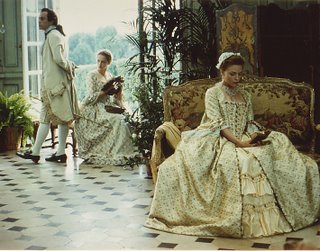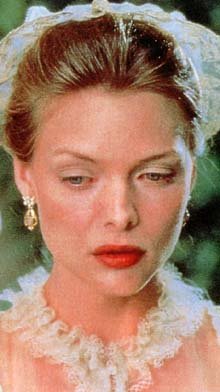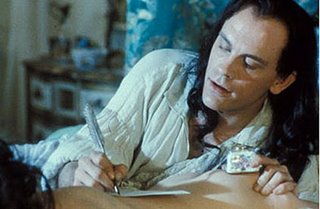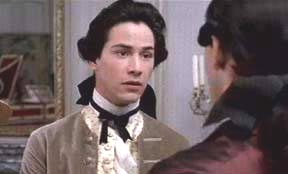 Directed by Stephen Frears, from the play by Christopher Hampton, based on a 1782 novel by Pierre Choderlos de Laclos.
Directed by Stephen Frears, from the play by Christopher Hampton, based on a 1782 novel by Pierre Choderlos de Laclos.Starring: Glenn Close, John Malkovich, Michelle Pfeiffer, Swoosie Kurtz, Uma Thurman, Keanu Reeves.
Positives: Beautiful cinematography, costume, art/set design and musical score. Eye candy, won awards for art design, etc (Muller, Films of the 80s).
Based on the epistolary novel les liaisons dangereuses (1782) by Pierre Ambrose Francois Choderlos de Laclos http://www.litencyc.com/php/speople.php?rec=true&UID=2588, watching this movie is like watching (or reading) a neoclassical play, with its witty, albeit wordy dialogue. I would rather have read novel, though, because in the context of a Hollywood film some of the dialogue seems…I don’t know…corny.
An 80s theme evident in Dangerous Liaisons is the idea of a decadent upper class or the evils of the aristocracy and how its members use money to get what they want. (Although 80s films often feature upper middle class protagonists, they’re still middle class mostly.) On the other hand, the “good” characters in Dangerous Liaisons are also aristocrats, but they happen to be pathetic victims of Merteuil and Valmont.

The film, being a period piece and very well-done in that respect, holds up visually. The stunning beauty of the film and the score made the rest of it bearable to me, but barely. Nevertheless, I never had any desire to see this film and don’t plan on ever sitting through it again. I’ll explain why in a bit.
In terms of gender/sex issues, I don’t think it holds up. First, it seems that, despite its stance against the corruption of the upper classes and the horrors of contemporary education for women (which Laclos explores more thorougly in another work), it shows the dangers of an educated woman with power. I think Laclos was writing based on old ideas of what “a woman’s place” should be. Though Enlightenment era philosophers and writers like Laclos rejected religious and moral traditions, they had backwards ideas about women and non-whites, e.g. even Rousseau was sexist. I acknowledge that I could be totally off but I also know that readers can interpret his work in various ways. Assuming that the work is misogynistic in nature, the filmmakers could have compensated for some of that; however, (aside from the plot) it still features lots of shots of naked female body and none of the men. None that I remember. We may have been treated to naked Malkovich-butt, but I shudder at the thought.
Glenn Close, who plays Merteuil, is pretty much flawless, as usual. Malkovich, whom I cannot stand, does a good job as Valmont. Everyone is good, and the young Keanu’s burnout accent is not as detectable as I had feared. Michelle Pfeiffer plays her usual wounded, vulnerable, fragile, beautiful character (she was that way even as Catwoman in Batman Returns, particularly in the beginning and towards the end). But she and Uma Thurman play the crappy roles they got really well.
 The oh-so-virginal, angelic Mademoiselle Cecile de Volanges (Uma Thurman).
The oh-so-virginal, angelic Mademoiselle Cecile de Volanges (Uma Thurman).
 The oh-so-virtuous, angelic, meek Madame Marie de Tourvel (Michelle Pfeiffer).
The oh-so-virtuous, angelic, meek Madame Marie de Tourvel (Michelle Pfeiffer).
Some still shots of the characters: http://www.homevideos.com/moments/dangerous.htm. (Glenn Close isn’t naked in the movie but her cleavage gets lots of attention; there’s a still shot devoted to just that.)
:::SPOILER ALERT:::
OK, this is some of the beef I have with the movie.
Valmont is one evil son-of-a-bitch. For all the bitching I’m about to do on how women are portrayed in this film, I have to say: he makes men look bad. He destroys every woman he comes in contact with in the film, except for his paid prostitute.

The only woman that is ‘better at the game’ than Valmont, is Merteuil (Glenn Close). While they both use money and sex to get what they want, she is better at manipulating and controlling people. Merteuil is the only woman capable of ruining him without completely losing herself, but she is STILL destroyed in the end!
Both Valmont and Merteuil deserve what they get, for Merteuil is a selfish prig as well, but although he dies and she lives, he dies almost a hero while her dignity and reputation are gone. She starts out with a good rep, he with a bad rep; in the end he gets somewhat of a dignified death, with room for sympathy from the audience, while her rep is destroyed and the audience feels good about it.
There is a point where Merteuil could ‘get’ him, teach him a lesson. Certain moments indicate that she is his puppet master and he knows it. But she ends up failing in large part because, like every other weak woman he messes with, she loves him, too. Indirectly, her jealousy gets the better of her, and he ends up ‘getting’ her in the end.
Falling in love with Tourvel (Michelle Pfeiffer) teaches him, but it costs Tourvel’s life. Although he falls desperately in love with her, the film could have done more with that. He doesn’t seem as in love, as defeated by it, as his dying words indicate—and, in my opinion, not enough to convince the audience in the end that he had learned his lesson (especially since he keeps harassing Merteuil about keeping her promise!). The film could have given him an emotional breakdown or something. All we get are flashbacks during the duel scene of him and Tourvel making love, which distract him. I’m left with the impression that he probably would have survived the love he felt for Tourvel if his own exploits outside the Merteuil/Valmont/Tourvel triangle, i.e. his affair with Cecile (Uma Thurman), hadn’t led to his death. But that affair conveniently provided the springboard for Merteuil’s revenge against him for falling for Tourvel. Ooooh, that Merteuil is crafty.
 "Whoa! Dude! Did what I think just happened ...happen?!" (allusion to ending of film)
"Whoa! Dude! Did what I think just happened ...happen?!" (allusion to ending of film)
Back to Merteuil. The film begins with her looking in mirror, looking beautiful and refined. She is RICH and VAIN. The movie ends with her looking humiliated and broken, removing her makeup. That, and death of Valmont can symbolize the downfall of the aristocracy, but her fall is more humiliating. (Remember, his is kind of heroic and tragic??) The ending illustrates Merteuil’s comment earlier that “vanity and happiness are incompatible.”
 The evil, vain, crafty Marquise Isabelle de Merteuil at the beginning of DL.
The evil, vain, crafty Marquise Isabelle de Merteuil at the beginning of DL.
I felt exhausted watching these female characters’ terrible downfall, one after another, while the man gets his redemption, his hero’s farewell. He pretty much rapes Cecile, yet succeeds in turning her into a sex fiend who can’t get enough of him. He topples the virtuous, untouchable, devoted wife of another man, Tourvel, leaving her weak, crazed, sick, and then dead. He even defeats his female match in the end from beyond the grave.
I want to recommend this film, but I couldn’t help but feel, as the end credits rolled: “That was two hours of my life I won’t get back.”
Frankly, for all its expensive production, Dangerous Liaisons was excruciating to watch. But if you want to see an 18th/early 19th-century period piece with classical and baroque music, watch the brilliant, earlier film AMADEUS (1984) directed by Milos Forman, which is one of my all time favorite films. Like the poster says, it won 8 Academy Awards, including Best Picture. It has the requisite sexist moments, but overall it is FAR superior. It is also visually stunning with a great score. I got the feeling that DL borrowed heavily from the art direction of Amadeus (which makes me wonder if that's why Forman was compelled to make a version of Dangerous Liaisons entitled Valmont in 1989, which bombed.). Amadeus is clever, moving, exciting, and quite funny, with excellent performances by F. Murray Abraham and Tom Hulce.

1 comment:
A Die Hard connection:
One reason that Alan Rickman was cast as the villain in Die Hard was based on his performance on stage in London as Valmont in the original production of Christopher Hampton's adaptation of the novel.
However, they didn't cast him for the film where his interpretation of the role would have been much different than Malkovich's interpretation.
Post a Comment